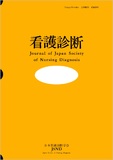Japanese
English
- 有料閲覧
- Abstract 文献概要
- 参考文献 Reference
本研究は,日本における人々の尊厳を保持する看護ケアをメタシンセサスのメタエスノグラフィ法によって明らかにすることを目的とした.看護実践の質的研究において「尊厳」を命名する語句のある本邦の32論文が選定され,概念が解釈された.人々の尊厳を保持する看護ケアは,かけがえのない価値として受け取る感覚が保持される看護ケアと定義され,人々の価値の協調がある4様相12概念から成るモデルが考案された.その人の身近なコミュニティにおいて,疎外感がなく,依存でき,信頼できる,その人の身体において,消耗感がなく,存在力と生命力が強まる,その人の身上において,恥辱感がなく,意思と個性が重んじられる,その人の身辺において,拘束感がなく,居所と生活が整うである.モデルは,個々人の尊厳の感覚を共有する看護ケアを方向付け,人間の尊厳の関係論の解釈を背景に,国際的に発信できる日本の看護実践を特徴とする.
This study aimed to clarify a nursing care model for preserving people's dignity in Japan through a meta-synthesis, meta-ethnography method. Thirty-two articles in Japan with phrases inductively referring to dignity in qualitative studies of nursing practice were selected and the concepts were interpreted. Nursing care for preserving people's dignity was defined as nursing care that preserves a sense of irreplaceable value. Next, a model in which people's values are coordinated was conceived.The model consisted of the following four aspects and 12 concepts: 1)in the person's immediate community: no sense of alienation, dependable, and trustworthy; 2)in the person's body: no sense of exhaustion, and strengthened existence and vitality; 3)in the person's circumstances: no sense of shame, potential intentions, and personhood are respected; and 4)in the person's surroundings: no sense of restriction, and well-ordered place and life. This model promotes nursing care in which an individual sense of dignity is shared and includes the characteristics of nursing practice in Japan that can be shared internationally according to a relationalism-based interpretation of human dignity.
Copyright © 2025, Japan Society of Nursing Diagnosis. All rights reserved.


